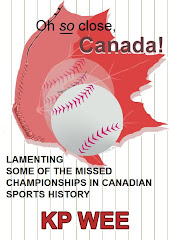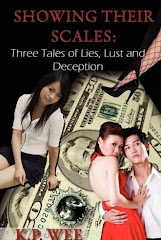Should a team get a point for losing?
Of course, everyone who follows hockey knows this.
The NHL awards teams that lose in overtime and in the tie-breaking shootout a single point, while the winning team gets two points.
Huh?
How can there be a total of three points awarded (to both teams) when a regulation game awards only two?
Strange.
Yes, I understand the league's reasoning behind it.
Previously, before the NHL started adopting the "extra point" rule (and before shootouts were used), teams could basically be tied after regulation, and then play it conservatively in the OT period and pray for that single point. Be aggressive and go for it, and have it backfire if the other team scores, and you lose everything. No points for a 60+ minute effort.
Thus, coaches preached playing it safe, and skate away after that five-minute OT session with a single point.
Yes, I get that.
So, the single point that is now awarded for OT and shootout losses is supposedly going to make teams go for it and not worry about losing if they get caught in odd-man breaks.
Teams could go for it and try to score, knowing that they have already secured that "loser" point regardless of what happens next. If they actually win, they get two points.
Yes, I know that too.
And, with a lot of games being close and all these extra bonus points awarded for losses, it has created a more competitive game--on the ice and in the standings.
For example, just randomly taking a look at the standings, say on February 14, 2008, you will see the following scenarios:
Toronto, despite being last in the Eastern Conference with 55 points (and second last overall in the entire league), was just 8 points behind eighth-place Boston (63) for the final playoff spot in the conference.
The Maple Leafs had been inconsistent all year long during the 2007-08 season, and had blown third-period and last-minute leads in several games. And they had those bonus points to show for their failures, and those points had piled up and made it seem like they still had a shot.
That's what the NHL is trying to do, trying to create this competitive balance. Teams that still think they are in the playoff race will probably not want to tank the season and start a fire sale. Good for the league, good for fan interest, et cetera, et cetera.
However, the problem here is that this system is giving fans false hope.
Tampa Bay, with 56 points on the same day, was No. 14 in the conference, but was only 6 points away from being tied for the division lead in the mediocre Southeast Division. If the Lightning went on a hot streak, they might well catch up to the division leaders and could see themselves in third place in the entire conference (since division winners were ranked 1-2-3 in the conference standings).
And just to look at this humorously for a second, a team could basically go 0-0-82 (ie. not win any games, losing all 82 games in overtime or in the shootout) and get 82 points. That's a .500 record, for not winning a single game. Wow.
Professional athletes--hockey players, that is, as we shall see in a second--are getting paid big bucks but need to be rewarded with these consolation points.
Teams can proudly proclaim that "this is the greatest season in history" and point to the high point-total that is inflated by those loser points. And perhaps jack up ticket prices too.
But seriously, is there any other league out there amongst the "big four" in North America that awards points to losers?
Nope. Not in Major League Baseball. If you lose a 23-inning marathon, that's too bad. You get nothing in the standings. Just go out and play again the next day (or same day).
Not in basketball. You keep playing until someone loses. And your team could score 150 points in the game and not be rewarded in the standings. If you lose the game.
Not in football. You lose in overtime because your kicker blew it but the other team's didn't. Well, you might have to go home while the other teams play on in the playoffs.
The only other comparable situation would be the Canadian Football League (CFL), where a missed field goal could result in a single point. But the CFL is not really a major league, so I digress.
Anyway, the point here is, the concept of giving points to losing teams is a bit goofy. No other leagues do it.
So why the NHL?
Lots of things don't make sense in the NHL, but this loser point system is one that is so ridiculous that other leagues don't even bother.
"Showing Their Scales" and "The Hockey Farmer"
We are pleased to introduce the works of local B.C. authors KP Wee and Farhan Devji to you:
"Showing Their Scales" contains three tales of lies, lust, and deception. These are short novels which deal with betrayal and revenge, with three main male characters and how they end up hurting the women in their lives.
**Catch an episode of BlogTalkRadio here with KP's interview on his books, recorded Dec 29, 2008.**
"The Hockey Farmer" is a story about Logan Watt, who hails from Cochrane, Alberta, and has to decide whether to rehabilitate the legendary family farm or pursue an unlikely career in professional hockey. The story also shifts to Vancouver and contains numerous Vancouver Canucks references.
Help support a pair of B.C. authors by picking up your own copies today!
-- "The Hockey Farmer" can be purchased here,
while "Showing Their Scales" can be bought here. --
"Showing Their Scales" contains three tales of lies, lust, and deception. These are short novels which deal with betrayal and revenge, with three main male characters and how they end up hurting the women in their lives.
**Catch an episode of BlogTalkRadio here with KP's interview on his books, recorded Dec 29, 2008.**
"The Hockey Farmer" is a story about Logan Watt, who hails from Cochrane, Alberta, and has to decide whether to rehabilitate the legendary family farm or pursue an unlikely career in professional hockey. The story also shifts to Vancouver and contains numerous Vancouver Canucks references.
Help support a pair of B.C. authors by picking up your own copies today!
-- "The Hockey Farmer" can be purchased here,
while "Showing Their Scales" can be bought here. --
The Hockey Farmer / Showing Their Scales

Subscribe to:
Post Comments (Atom)
Brief Resume Highlights
Writing Experience
- Bleacher Report: contribute articles on the Vancouver Canucks, Boston sports, hockey, and baseball at least three times a week (2007-Present); edit sports-related articles from other posters (2008-Present)
- UCL: developed Career Planning curriculum (2007); consulted on for other curricula issues (2005-Present)
- Consumer Research: submitted unsolicited proposals for improvements on company operations (2005)
- B.U.D. College: developed Grammar curriculum consisting of five levels (2004); edited curricula for other courses (2004)
- KGIC: developed Career Planning curriculum proposal for Surrey campus (2004)
Writing Accomplishments
- Named Bleacher Report Bruins Community Leader (2008)
- Bleacher Report: contribute articles on the Vancouver Canucks, Boston sports, hockey, and baseball at least three times a week (2007-Present); edit sports-related articles from other posters (2008-Present)
- UCL: developed Career Planning curriculum (2007); consulted on for other curricula issues (2005-Present)
- Consumer Research: submitted unsolicited proposals for improvements on company operations (2005)
- B.U.D. College: developed Grammar curriculum consisting of five levels (2004); edited curricula for other courses (2004)
- KGIC: developed Career Planning curriculum proposal for Surrey campus (2004)
Writing Accomplishments
- Named Bleacher Report Bruins Community Leader (2008)




No comments:
Post a Comment